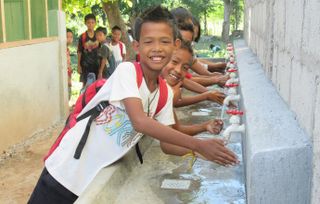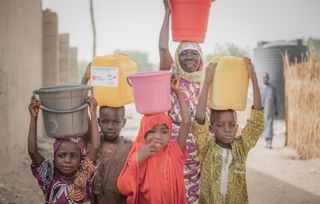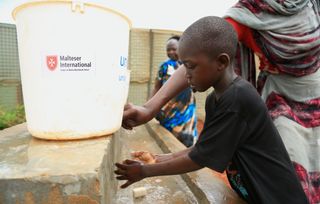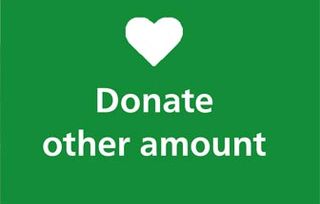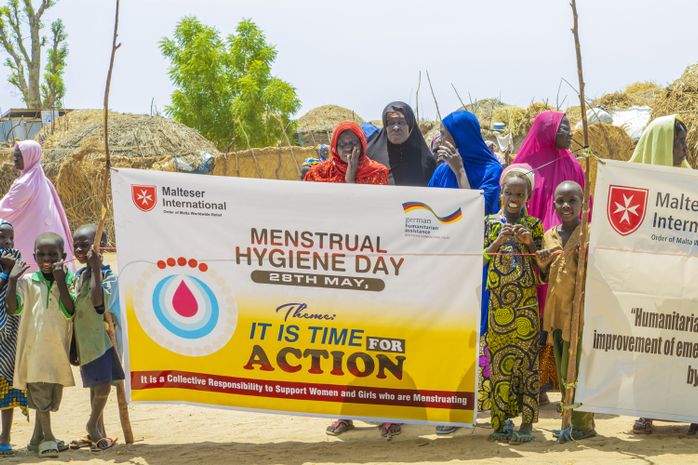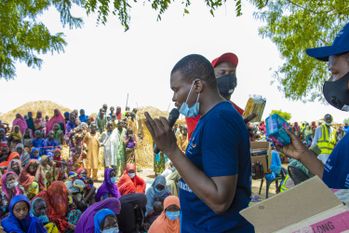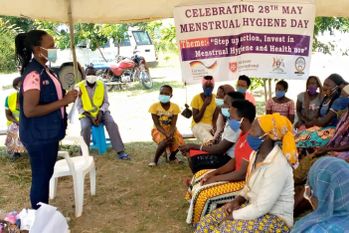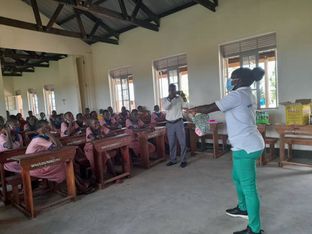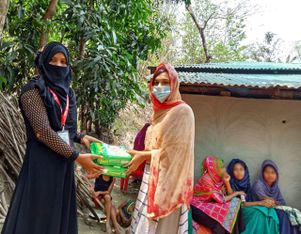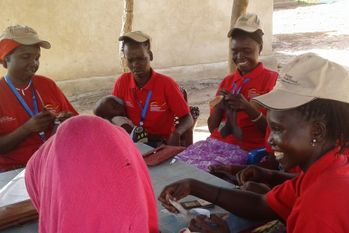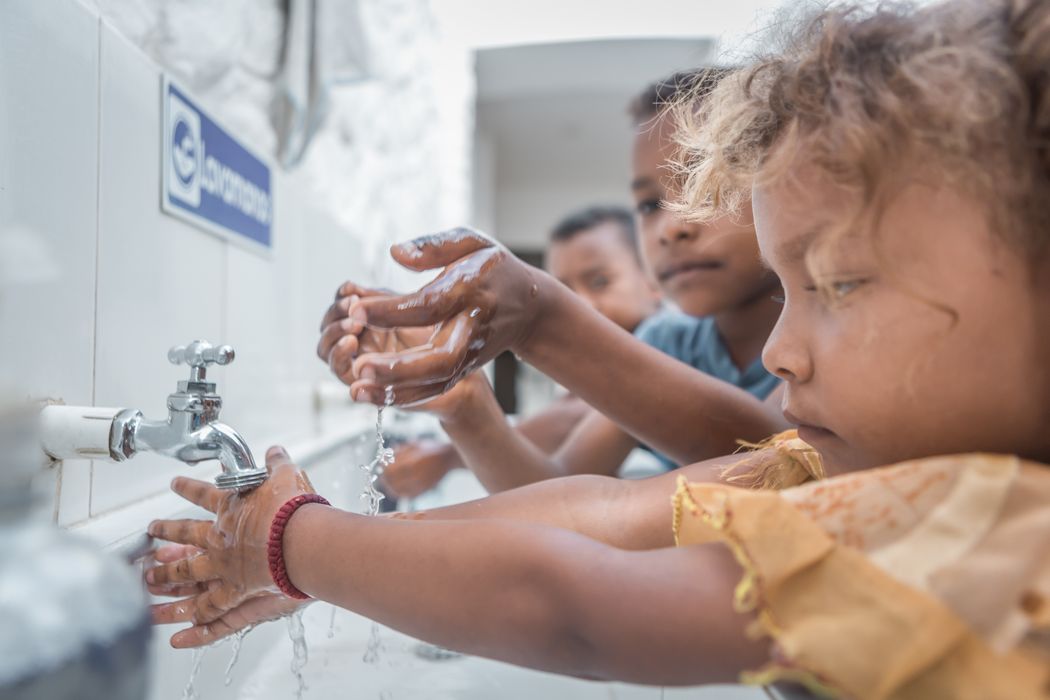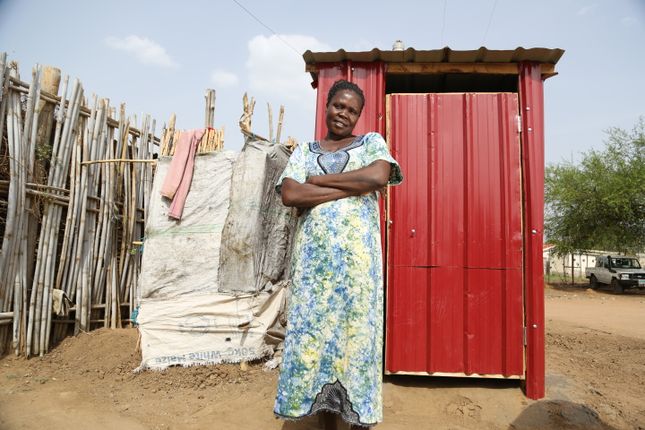
Menstruation: hygiene, health and education
Menstruation is a completely natural process. Every day, an estimated 300 million people menstruate. And yet menstruation is still a taboo topic worldwide. Girls and women who have their periods experience stigmatization and exclusion in many regions. For example, due to the taboo nature of the subject, many do not dare to go to school or work while they are menstruating. Some 500 million women and girls do not have access to the resources they need to manage their menstruation with dignity and health.
This has immense consequences and can have a negative impact both individually and on society as a whole, including health, education, work and gender equality. Malteser International therefore advocates for improvements in menstrual hygiene and health, especially in countries of the Global South, and tries to counteract the taboo of menstruation, which is also a reality in countries of the Global North.
Secure access to water – your donation counts
The worldwide taboo of menstruation and its consequences

Women and girls still experience stigmatization and exclusion because of their periods. The taboo of menstruation is a global problem that does not only affect countries of the Global South. In countries of the Global North too, many girls and women feel shame about their periods and withdraw from public life during menstruation. For example, they are too afraid to talk about the topic or feel embarrassed when buying tampons and pads at the supermarket. According to the SCA Hygiene Matters Report 2016/17, more than half (52%) of women and girls in Germany feel uncomfortable in social situations during their period.
The 2019 case of a Kenyan girl illustrates the dire consequences that stigmatization based on menstruation can have for women and girls: The 14-year-old took her own life after getting her period for the first time at school and being humiliated and expelled from the classroom by her teacher due to a blood stain on her school uniform.
In some African and Asian countries, women and girls who have their periods are considered "unclean". Out of shame and fear of humiliation, many do not dare to go to school or work during their period. At least one in ten sub-Saharan girls does not attend classes during her period, according to UNESCO. As a result, they miss more than 20 percent of their education, lose out and jeopardize their chances of graduating from school. In many places, the taboo surrounding menstruation prevents young women and girls from realizing their educational opportunities, getting a well-paid job and creating better living conditions for themselves.
Hygiene during menstruation is difficult in poorer countries
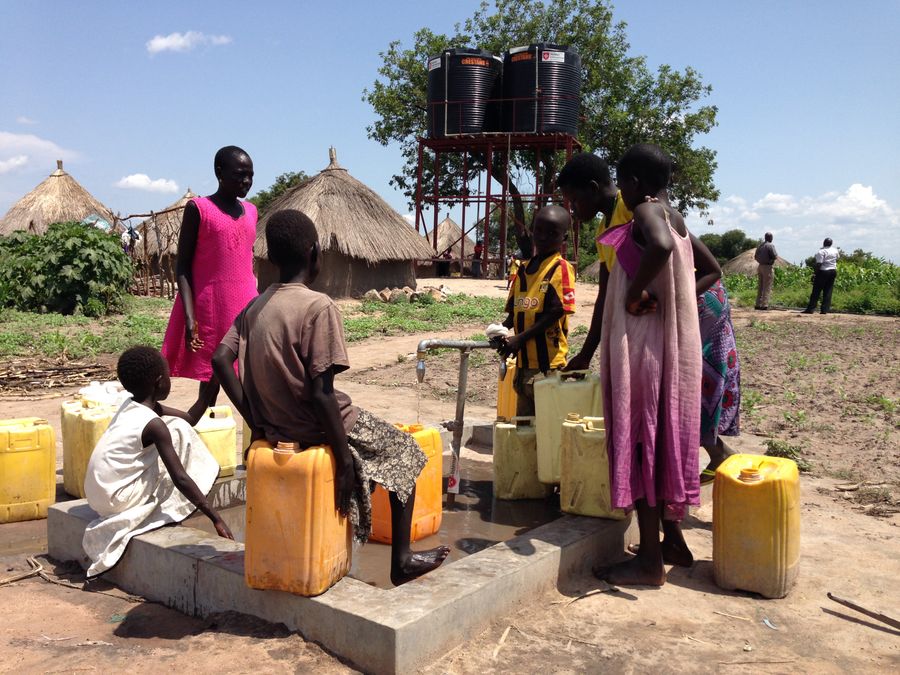
The hygienic situation in poorer countries is often critical and a serious threat to the health of the population. In many places, access to clean water, washing facilities or sanitation is lacking.
Under these conditions, it is hardly possible for women and girls to maintain a sufficient level of hygiene during their menstruation. Access to hygiene products such as sanitary pads and tampons etc. is limited or women and girls simply cannot afford them. In Kenya, for example, a pack of sanitary pads costs almost as much as people there earn in a day. In their time of need, women and girls resort to cloth, sponges or cotton during their period. However, these measures are usually insufficient to absorb the bleeding and can also lead to infections that endanger the health of those affected.
In addition, women and girls often have neither access to clean water nor a private space such as lockable toilets with clean water where they can change pads, dispose of them and perform other hygiene measures during menstruation. Thus, the shame and fear of being exposed and humiliated in public by a blood stain on their clothes also grow.
The fact that in Germany the value-added tax on menstrual products was not reduced from 19 to 7 percent until 2020 makes it clear that also in European countries, free access to hygiene products that women and girls need during their periods is far from commonplace. In the poorer countries of this world, however, the consequences of this shortage are particularly existential.
Menstrual hygiene and health as a global goal
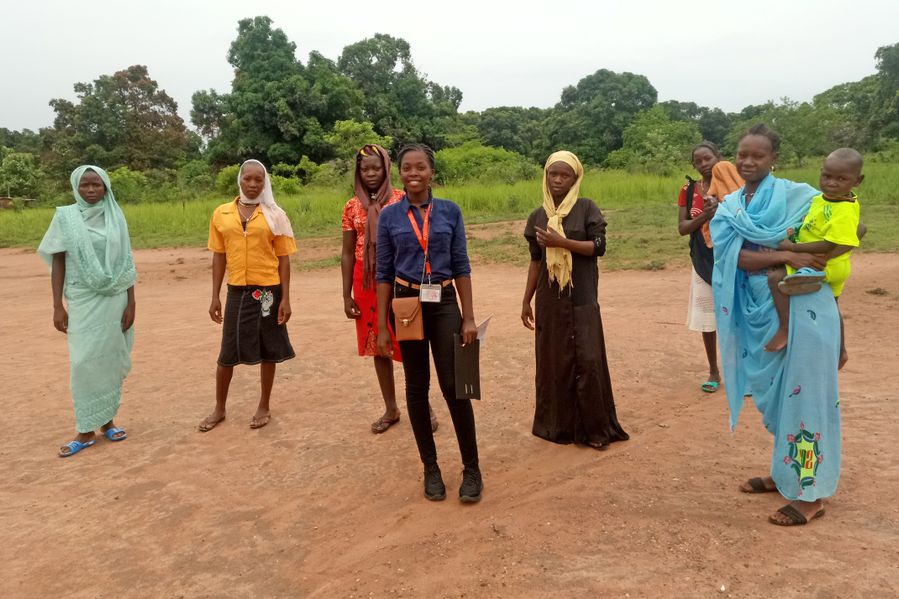
The improvement of menstrual hygiene, especially in countries of the Global South, is an important part of all commmitments in the WASH (water, sanitation and hygiene) sector and thereby an integral part of the humanitarian and development work of Malteser International.
MHH (menstrual health and hygiene) is also firmly anchored in the Sustainable Development Goals (SDGs) signed by the United Nations General Assembly in 2015. Under Sustainable Development Goal No. 6, "Clean water and sanitation," the UN recognizes the right of women and girls to menstrual hygiene and health.
Accordingly, by 2030, access to clean water and sanitation should be available to all, whereby a special focus should be on the vulnerable situation of women and girls.
Taking into account the marginalization women and girls experience due to menstruation, the negative impacts on their chances to education and employment as well as their health, MHH is also implicit in SDG 3 "Health and well-being", SDG 4 "Gender disparities in education", SDG 5 "Gender equality" and SDG 8 "Decent work and inclusive employment". In this context, MHH becomes a global goal to which the United Nations and member countries are committed.
Requirements for good menstrual hygiene and health
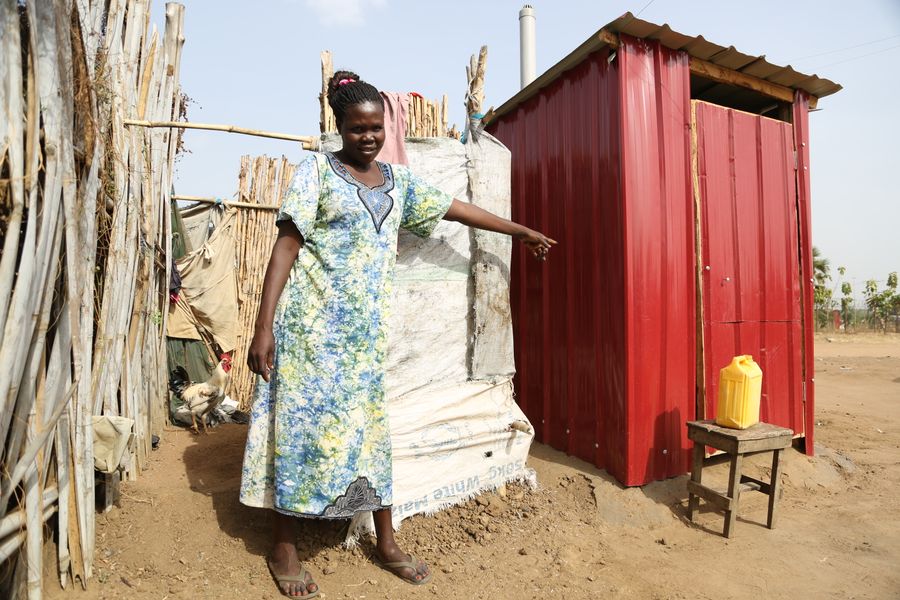
In order to create better conditions for menstrual hygiene, especially in poorer countries, hygiene and sanitation must be improved on the one hand, and work on menstruation education and social acceptance must be done on the other. In the area of hygiene and sanitation, an infrastructure of sanitary facilities such as washing facilities and appropriately equipped toilets must be created. In addition, women and girls need free access to period products such as tampons, pads and menstrual cups.
The second important area is education about menstruation. This involves providing women and young girls with knowledge about the female cycle and menstrual hygiene and offering them a place to go to. Education, which should also include boys and men, is also accompanied by the goals of destigmatizing women and girls and removing the taboo surrounding periods. These must be achieved urgently in order to end the social and societal exclusion that affects women and girls because of their periods.
Developments to date: free distribution of sanitary pads in Kenya
In Kenya, the first steps have already been taken toward improving menstrual hygiene for women and girls. In 2011, for example, the Kenyan government abolished the tax on sanitary pads and tampons. In 2017, a law was passed that requires schools to distribute free pads. The law is a great financial relief for many families who can hardly or not at all afford appropriate hygiene articles. The Kenyan government now provides around 4.3 million euros annually for the supply of sanitary pads. As a public act, the law also has symbolic power, which is a first step toward removing the taboo surrounding menstruation. Nevertheless, the road to social acceptance is still long and requires adequate education programs.
In other African countries, measures to improve menstrual hygiene have not yet been legally established. Oftentimes, corresponding government intentions also fail due to a lack of funding opportunities. This makes the work of NGOs, which support women and girls by providing them with hygiene articles or carrying out educational work, all the more important.
In 2014, WASH United launched Menstrual Hygiene Day (MH Day), which has since been celebrated annually on May 28. The day shines a spotlight on menstruation and the related global issues of stigma, taboo and menstrual hygiene. The initiative is linked to the hope of mobilizing power and decision-makers to recognize the importance of the issue and take action.
Menstrual Hygiene Day: How we celebrated
Our commitment to women and girls: Improving menstrual hygiene and education
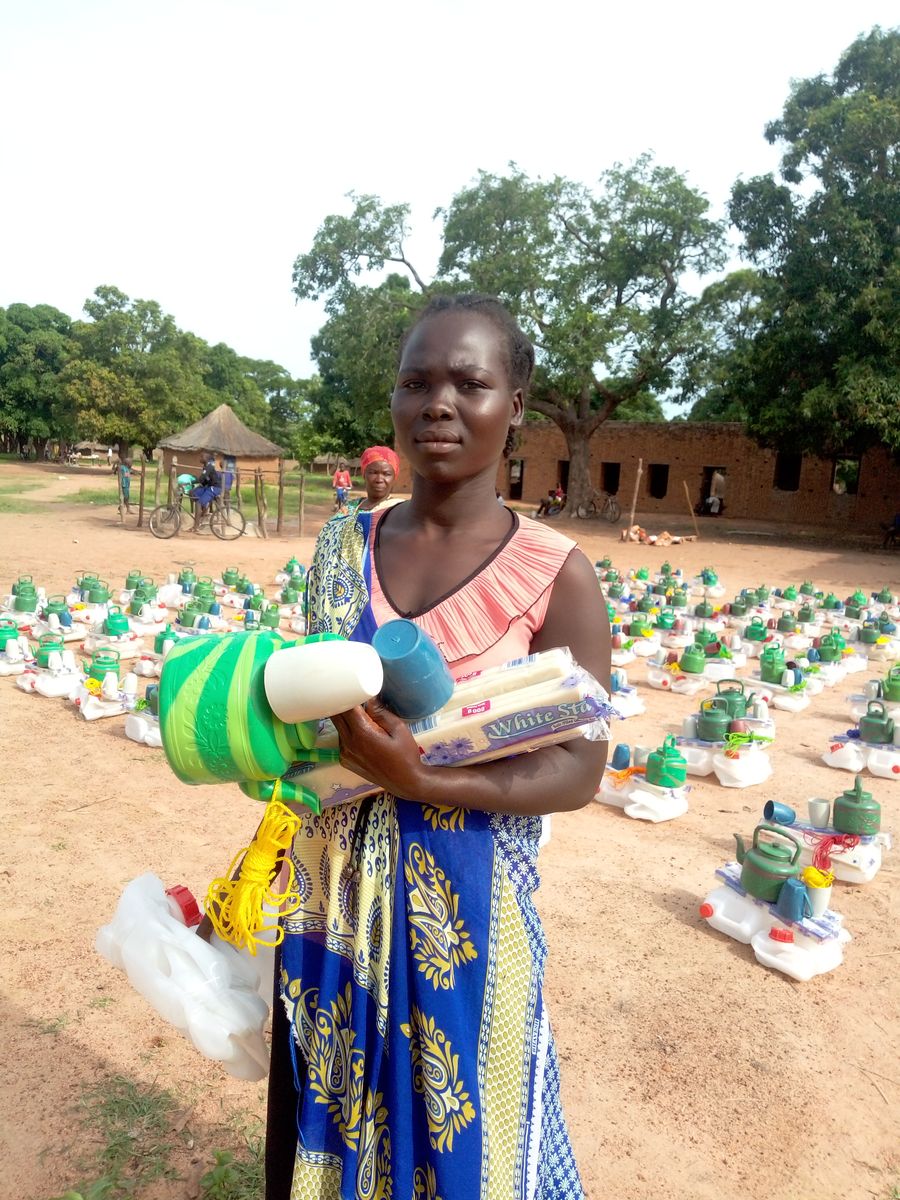
At Malteser International, we are committed to creating better conditions for menstrual hygiene in our project countries and to driving social acceptance.
Since good menstrual hygiene is only possible under the condition of holistically improved hygiene and sanitation, our commitment in the area of MHM (menstrual hygiene management) also includes general measures such as the creation of free access to clean water. In South Sudan, for example, we are working with local communities to establish systems for fair water supply and are building sanitary facilities in public places, schools and health facilities.
In Haiti, we have already built latrines to provide women and girls with the privacy they need to change and dispose of tampons and pads. We have also distributed pads and tampons that are not affordable to people living in poverty.
Similarly, during disaster relief operations, we ensure that period products are included when hygiene kits are distributed and that communities are sensitized to the use of these products.
Equally important as the material and financial support is the educational work in the area of menstruation and menstrual hygiene. In our training sessions for school children, girls learn the basic measures of menstrual hygiene, such as changing and correctly disposing of pads and tampons. Most importantly, they learn about periods as a natural process of the female cycle that they should not be ashamed of. Boys also learn that menstruation is something completely normal and that there is no reason to ostracize women and girls during their periods. Menstruation education is essential to improve the situation of women and girls. Only when the subject of menstruation is no longer taboo can social exclusion and its existential consequences be brought to an end.

